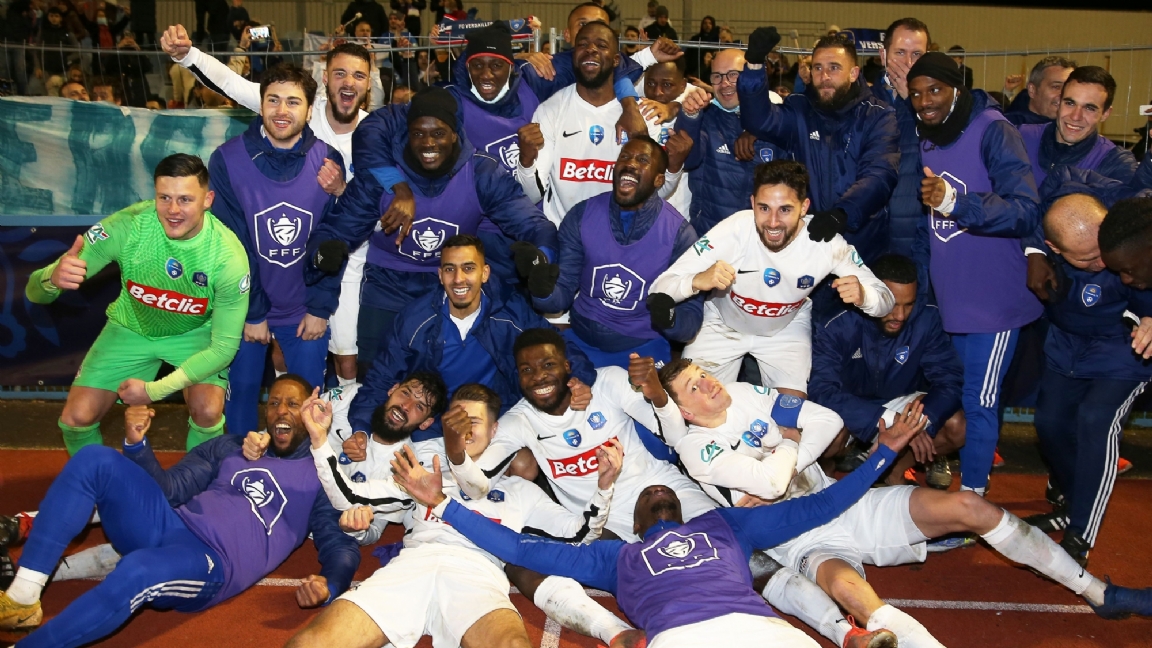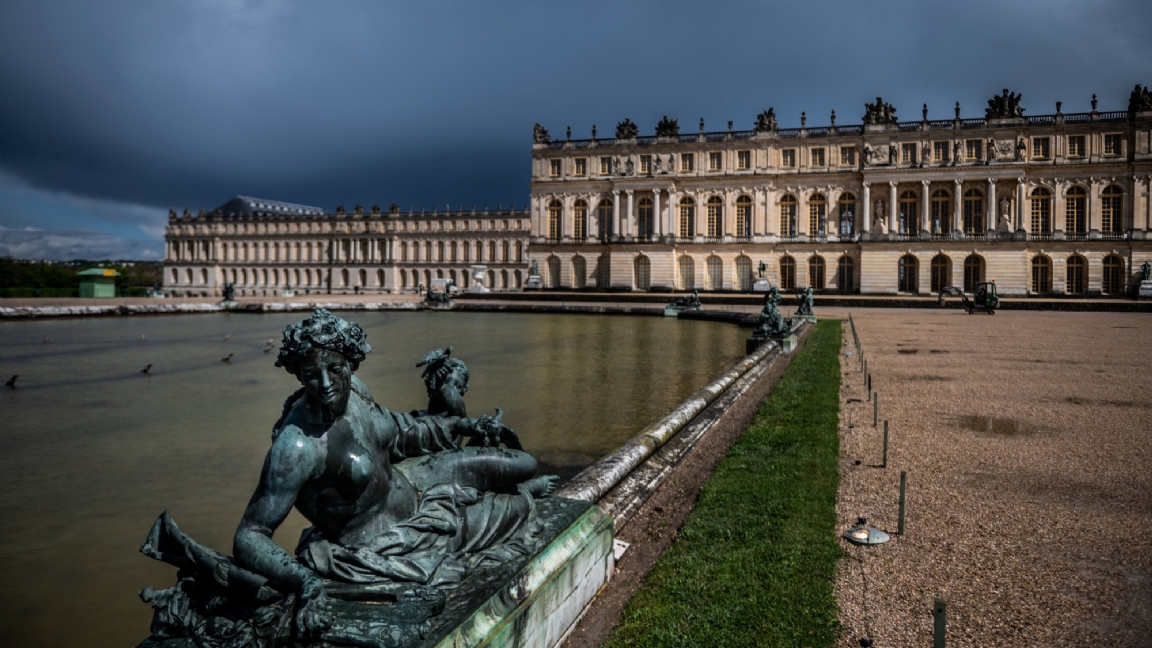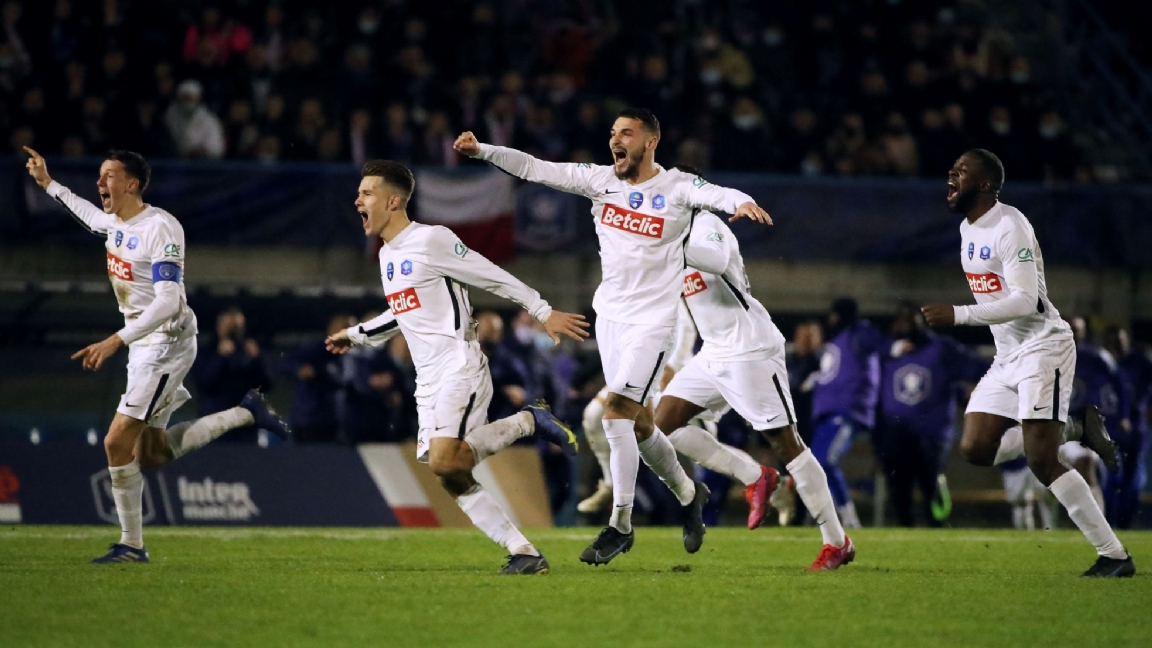![]()

Between OGC Nice, FC Nantes and AS Monaco, FC Versailles 78 is the odd one out in the semi-finals of the Coupe de France, which will be played next week. The club, which plays at the fourth level of French football, reached the last four of the cup tournament by eliminating Toulouse – the leader of Ligue 2 – among other things. Due to a law dating back to the seventeenth century, the biggest game in club history for the time being cannot be played in the own Stade de Montbauron. The tranquility of King Louis XIV is a major stumbling block to the ambitions of FC Versailles.
By Chris Meijer
If you walk a little bit south from the Stade de Montbauron towards the Avenue de Paris, you can see the immense Palace of Versailles about a mile away. In the seventeenth century, Louis XIV – also known as the Sun King – had his father Louis XIII’s hunting lodge converted into a gigantic palace on a domain of eight hundred hectares for two to three hundred million euros. To ensure the tranquility of the area and to prevent anything from blocking people’s view of the Palace of Versailles, all light sources within a radius of five kilometers around the domain were banned. There would still be a law that prohibits artificial light from being visible from King Louis XIV’s room.
The Stade de Montbauron therefore has no lighting, although the reason for this is somewhat more nuanced than this law dating from the seventeenth century. The Palace of Versailles and the view from the rooms were added to the UNESCO World Heritage List in 1979. As a result, it was determined that nothing could be built higher than the buildings and nature that already existed and FC Versailles – created in 1989 from a merger between Racing Club de Versailles and Compagnons Sportifs Versaillais – was never able to place light poles at the Stade de Montbauron . Until now, that was never really a problem, because FC Versailles spent its entire existence on the lower levels where the matches are played during the day and lighting in the stadium is basically unnecessary.
However, FC Versailles has the ambition to move up the French football pyramid. When Daniel Voisin took office as president in 2004, the club – where Thierry Henry, Jérôme Rothen and Hatem Ben Arfa played in youth – was on the brink of death both sportingly and financially. Under his leadership, FC Versailles grew into a stable club with one of the largest membership numbers in France (1200) and the first team climbed from the eighth level to the fourth level. But when FC Versailles became champions in the Championnat National 3 in 2020, Voisin realized that the budget of 350,000 euros was too small to maintain itself structurally in the Championnat National 2. With the real estate company Fiducim – City-GC of Christophe Petit and Julien Ridon an investor was found who had been looking for an opportunity to get into football for some time.

The Palace of Versailles.
“When we started with the investors, we wanted to put the values of the club first. We didn’t want to act like the ‘Qatari of amateur football’ by throwing a huge amount of money down the drain. This does not fit with the DNA of FC Versailles,” Voisin, who initially became involved with FC Versailles as a football father and held the positions of referee, leader and trainer before being elected president, told So Foot† Internally there was a difference of opinion about how the fivefold budget should be spent. Trainer Youssef Chibhi – who has been with the club for eighteen years and has been responsible for the first team since 2014 – decided to renew the selection for eighty percent with experienced players. “I would have preferred that we had remained humble. This sends the same signal as Paris Saint-Germain to your youth players: if you want to play, you have to go somewhere else. From the start of this season, several players and staff members have been dismissed due to decisions by the trainer. That’s my fault, because I gave him too much freedom.”
The investors decided in November of the previous calendar year to end the power struggle. Voisin was forced out and replaced by Jean-Luc Arribart, a former player of Stade Rennes and Stade Reims, who worked as an analyst and commentator for French television after his active career. Arribart must reinforce the investors’ ambitions. It actually means that FC Versailles has to promote to the Championnat National 1 this season, although that is not immediately spoken out loud. “I would be lying if our ambition was to be stable in the Championnat National 2. But we also don’t want to blow too high of the tower and pretend we are Paris Saint-Germain,” Arribart said. So Foot† FC Versailles is currently in the lead, three points ahead of Lorient’s second team. The promises cannot promote and number three Saint-Pryve Saint-Hilaire is seven points behind.
Given the selection, FC Versailles may be obliged to promote at its position this season. Despite lesson Bleus are officially still an amateur club, almost all players with an average monthly salary of three thousand euros can fully live off football. Only Wilfried Alledji (management controller), Oussama Berkak (ICT consultant) and Maël Durand de Gevigney (physiotherapy student, incidentally the only self-trained player in the starting eleven) currently have a job or study in addition to their football career. Due to the good financial situation – a budget of one and a half to two million euros – FC Versailles, unlike surrounding clubs, is able to remove players from the provinces.

FC Versailles cheers after the winning penalty kick in the quarterfinals of the Coupe de France against Bergerac.
A promotion would present FC Versailles with a complicated problem. The matches at the third level in the Championnat National 1 are played in the evening and clubs are required to have a floodlit stadium. A solution is currently being sought with the municipality, for example by erecting smaller light poles. This season’s campaign in the Coupe de France has already shown that the lack of lighting in the Stade de Montbauron is a problem. FC Versailles successively defeated Olympique Lumbrois, AS Poissy, Sarre-Union and La Roche Vendée, before Toulouse was the opponent in the eighth final. The duel with the Ligue 2 leaders could not be moved to the afternoon, when FC Versailles decided to return the role of home team and the game was finished in Toulouse.
After a sensational 0-1 win over Toulouse and a penalty shootout win against similarly level Bergerac in the quarterfinals, FC Versailles faced the same problem towards the semifinals against OGC Nice. There were unsuccessful attempts to move the match to the Parc de Princes of Paris Saint-Germain or the Stade Charléty of Paris FC and FC Versailles declined to play two hundred kilometers to the east (in Troyes) or further north (in Lens). “There were a number of uncertainties, for example whether we would be able to fill the stadium or whether the organizational costs would increase. We should have traveled far from Versailles,” Arribart said in an interview with Le Parisien† “Nice then offered to organize the competition, with a number of benefits for us. They didn’t force us into anything. But when you consider all the factors, this is the best solution.”
With the move of the semi-finals to Nice, the chance of a place in the final for Versailles seems minimal. “No, we don’t want to say that. We have won against Toulouse this way before. And it’s great for the players to play in such a stadium. Nice is having a hard time this season in its own stadium against smaller opponents on paper,” Arribart emphasized about the meeting with Calvin Stengs’ employer, Justin Kluivert and Pablo Rosario. “We will try to get as many people as possible from Versailles to Nice. We don’t go there to see the stadium, the sea and Promenade des Anglais. We have a minimal chance of reaching the final, but we will fight hard for it.”
